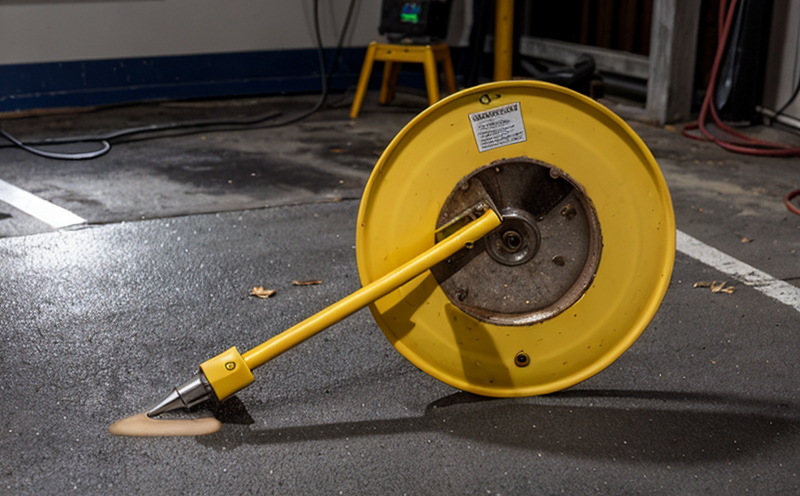ISO 16826 Ultrasonic Testing of Castings
The ISO 16826 standard provides a comprehensive framework for ultrasonic testing (UT) of castings in additive manufacturing and traditional casting processes. This method is crucial for ensuring the integrity, reliability, and safety of components manufactured using this technology.
Ultrasonic testing relies on high-frequency sound waves to inspect materials internally without causing damage or altering their properties. In the context of castings, UT can identify flaws such as porosity, shrinkage defects, cracks, and other internal inconsistencies that are critical for product performance and safety compliance. This service is particularly important in sectors like aerospace, automotive, and medical devices where component failure could lead to severe consequences.
The process involves placing a transducer on the casting surface, which emits ultrasonic waves into the material. These waves travel through the castings until they encounter an internal defect or reach the opposite side of the part. Any reflection or alteration in wave behavior indicates the presence of imperfections that could compromise the component's structural integrity.
For precise and reliable results, careful specimen preparation is essential. This includes ensuring the casting surface is clean, free from contamination, and properly positioned for testing. The transducer must be correctly aligned to achieve optimal signal reflection and accurate defect detection.
The ISO 16826 standard specifies detailed procedures for UT, including pulse-echo techniques that allow for both flaw detection and measurement of thickness. This method is particularly effective in identifying small defects or thin layers within the casting structure. The use of advanced instrumentation ensures consistent and repeatable results, making it an indispensable tool in quality control processes.
Testing according to ISO 16826 not only enhances product reliability but also supports compliance with industry regulations and standards. This service is vital for manufacturers aiming to ensure their products meet stringent safety and performance requirements.
The ultrasonic testing process can be tailored to various casting materials, including alloys used in aerospace components or medical implants. The ability to detect minute flaws ensures that only defect-free parts are released into the market, thereby protecting consumers from potential risks associated with defective products.
By adhering to ISO 16826 standards, manufacturers can demonstrate their commitment to quality and safety, which is crucial for maintaining a positive reputation in highly regulated industries. This service also supports continuous improvement efforts by providing detailed insights into the casting process and identifying areas for optimization.
Why It Matters
The importance of ISO 16826 ultrasonic testing cannot be overstated, especially in sectors like aerospace, automotive, and medical devices. These industries demand components that are not only reliable but also safe from internal defects that could lead to catastrophic failures.
- Enhanced Safety: Defects within castings can compromise structural integrity, leading to potential accidents or malfunctions. Ultrasonic testing ensures that these flaws are identified and rectified before the component is used in critical applications.
- Regulatory Compliance: Many industries have strict regulations governing product safety and quality. Adhering to standards like ISO 16826 helps manufacturers comply with these requirements, avoiding costly penalties and legal issues.
- Improved Product Quality: By detecting internal defects early in the manufacturing process, companies can improve overall product quality, reduce waste, and enhance customer satisfaction.
In summary, ISO 16826 ultrasonic testing is essential for ensuring that castings meet the highest standards of reliability and safety. This service plays a pivotal role in maintaining trust with customers and regulators alike.
Why Choose This Test
- Precision: Ultrasonic testing offers high precision, allowing for accurate detection of even small defects within the casting material.
- Rapid Results: The process is relatively quick compared to other non-destructive evaluation methods, providing immediate feedback on the integrity of the castings.
- Non-Destructive: Unlike destructive testing methods, ultrasonic testing does not alter or damage the casting, preserving its structural integrity for further analysis if necessary.
- Versatility: The technique is applicable to a wide range of materials and component types, making it suitable for various industries and applications.
The combination of precision, speed, non-destructiveness, and versatility makes ISO 16826 ultrasonic testing an ideal choice for quality assurance in casting processes. This service ensures that only defect-free castings are released into the market, enhancing product reliability and safety.
Quality and Reliability Assurance
The ISO 16826 standard plays a crucial role in maintaining high-quality standards for ultrasonic testing of castings. By adhering to this standard, manufacturers can ensure that their products meet the necessary quality benchmarks and comply with relevant regulations.
- Consistency: The standard provides clear guidelines for test procedures, ensuring consistent results across different facilities and operators.
- Accuracy: Detailed specifications in ISO 16826 help achieve accurate defect detection and measurement, enhancing overall testing reliability.
- Repeatability: The standardized approach ensures that the same tests yield similar results over time, facilitating quality control processes.
In addition to these technical benefits, ISO 16826 also supports compliance with international standards and regulations. This is particularly important for companies operating in multiple jurisdictions or supplying products internationally. By meeting these standards, manufacturers can ensure that their products are safe, reliable, and meet the expectations of customers and regulators.
The use of this service contributes to a culture of continuous improvement within manufacturing processes. Regular testing according to ISO 16826 helps identify areas for optimization and innovation, ultimately leading to better product quality and performance.





